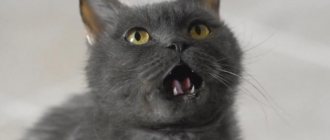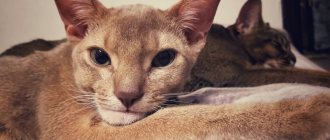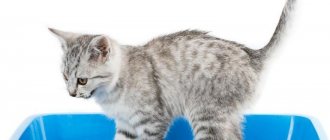Causes
Sneezing is a reflex process. With its help, the animal’s body gets rid of various irritants that have entered the nasal passages. If dust, dirt, hairs, or fluff gets into a kitten's nose, he will sneeze, trying to get rid of them. These are physiological causes that do not require treatment.
It’s another matter when sneezing is provoked by external and internal causes that negatively affect the health of the animal. These may be the following conditions and diseases:
- Allergic reaction. Cats can also suffer from the negative effects of poor ecology, react to strong odors, such as perfumes and aerosols, suffer from dust mites and other types of allergies. A sneezing attack can be triggered by cigarette smoke, plant pollen, odors of household chemicals, mold, cosmetics, air fresheners, even common kitchen seasonings.
- Bronchial asthma. Most often it appears as a complication after a severe allergy.
- Respiratory diseases caused by various infections. Typically, such diseases are accompanied by various additional symptoms that make it possible to distinguish them from other manifestations.
Possible diseases if a kitten sneezes
In addition to the above viral infections, possible diseases that cause sneezing in a kitten can be of a different nature. Unfortunately, the range of diseases is so wide that only a veterinarian can cope with the diagnosis.
The most dangerous are viral diseases, against which the kitten must be vaccinated.
If you pick up a baby on the street or buy it at a poultry market, the resulting viral diseases can cause its death.
Possible diseases of which sneezing may be a symptom are:
- Infectious peritonitis occurs without symptoms for a long time, and at an early stage of the clinical picture it is similar to a cold.
- Feline immunodeficiency virus is a slowly and secretly developing disease that adversely affects the body's immune system. When the cat's immunity level declines, it becomes vulnerable to any, even basic respiratory infections.
- Feline viral leukemia - in the first stages of development, is similar to a respiratory infection, in fact, it is a serious viral disease, which most often leads to death.
- Chlamydia - gives a complete picture of an acute viral respiratory infection complicated by bacterial infection. Unfortunately, chlamydia is highly contagious and common. One of the first symptoms of chlamydia is acute conjunctivitis.
- Mycoplasmosis is common, like chlamydia, contagious, and deadly. Mycoplasmosis progresses more slowly, but leads to more severe consequences: bacterial pneumonia and swelling of the respiratory tract.
Most viral infections cannot be diagnosed with guaranteed accuracy. To detect infection, blood is taken from the cat and examined for the presence of antibodies.
With viral infections, everything is a little more complicated; the causative agents of the disease must be found in the blood sample. This diagnostic method is called PCR. Unfortunately, PCR diagnostics are not available in all clinics and cost a lot of money, so most veterinarians, suspecting a viral infection in a kitten, begin complex, aggressive therapy.
Associated symptoms
When sneezing, a kitten may suffer from a runny nose, inflammation of the eyes, and discharge from them, including purulent discharge. A kitten who is sick with an infectious disease or has a severe cold or hypothermia will not only sneeze. He will have difficulty breathing, runny nose, tears, shortness of breath.
As the temperature rises, the animal refuses to eat, becomes lethargic, and tries to hide from people. He may develop vomiting, and if the bronchi and lungs are affected, characteristic gurgling and wheezing breathing occurs.
This condition threatens the pet's life.
In what cases is a visit to the veterinarian necessary?
You will not be able to handle treatment on your own if your kitten has contracted a viral infection. Your ward can survive if his immunity is strong enough to cope with the infection on his own. However, survival of kittens during viral infection is the exception rather than the rule.
In what cases is a visit to the veterinarian necessary:
- You know that your kitten has been in contact with virus carriers - it was picked up on the street, taken from a shelter, bought at a poultry market and does not have a vaccination document.
- The kitten has severe swelling of the eyes and ulcers on the mucous membranes.
- Against the background of loss of strength and severe depression, fever is observed.
- Constant drooling, copious nasal discharge, purulent discharge from the ears and eyes.
- Weight loss while maintaining appetite or a decisive refusal to eat.
- Enlarged lymph nodes.
- Wheezing or whistling when breathing, cough with or without phlegm.
- Breathing problems.
- Severe problems in the digestive system.
In addition, you should contact a veterinarian if the kitten does not have a severe clinical picture, but the sneezing continues for more than 3-7 days. Some viral infections develop secretly.
Immediately after infection, the kitten exhibits some symptoms, however, the immune system fights them. Under pressure from the immune system, the virus weakens, but remains in the body until the opportunity arises.
Treatment method and prognosis
Treatment is always related to the cause of the disease. If this is due to the animal’s environment, you need to remove the source of the allergy or irritation: remove poisonous or flowering plants, stop using caustic household chemicals, carry out a thorough cleaning and do not smoke, do not use aerosols or perfumes in the room where the kitten is.
Diseases should be treated only after consultation with a veterinarian, since only a specialist can determine the diagnosis, select medications and doses for a small kitten.
If you act on your own, you can seriously harm your pet.
How to help a kitten at home
Any disease requires timely diagnosis and professional treatment. But mostly, owners limit themselves to home methods of fighting the disease for 1-2 days. After this, the kitten often recovers if the disease is not severe and does not require surgical intervention.
If the kitten has a common cold, you need to provide the pet with warmth, give him plenty of warm liquids and his favorite food. You can also buy vitamins or cat grass at a veterinary pharmacy. A light massage of the shoulder blades will help, it will speed up blood flow.
It would also be a good idea to wipe the kitten’s eyes and nose with a weak solution of potassium permanganate or chlorhexedine.
If your nose is stuffy, you can rinse it with any of the following solutions:
- Novocaine 1% + Adrenaline;
- Tannin 0.5%;
- Ethacridine 0.2%;
- Zinc sulfate 2%.
If rinsing the nose does not help, and the situation has only worsened, you need to switch to the antibiotics Tobrex or Ciprofloxacin.
The use of Tetracycline ointment or Mastiet Forte oil suspension has proven itself to be effective. Use these products to lubricate your pet's nose 2-3 times a day.
As a rule, these measures are enough to help your kitten overcome a cold at home.
You should not give your kitten Paracetamol, because... For these animals, this medicine is toxic and may cause internal bleeding.
For what other diseases can you provide first aid to your pet:
- allergies: treat with antihistamines;
- infections: viral: antiviral and anti-inflammatory drugs;
- bacterial: antibiotics, immunotherapy;
- fungal: antifungal agents (pour into the nose);
What to do at home
There cannot be a definite and simple answer here; it is necessary to strictly follow all the doctor’s recommendations and not self-medicate.
A sick kitten should be kept warm and well fed. Since it may be difficult for him to eat due to a stuffy nose, it is best to give him soft, high-calorie, but easily digestible food. You need to make sure that he always has access to clean water and under no circumstances give him cold foods, including drinking.
Prevention of colds, infectious and viral diseases in kittens
Prevention of viral diseases is considered an essential aspect of kitten care. It is important to understand that even the highest quality vaccines do not guarantee that the kitten will not get sick. However, statistics show that vaccinated animals infected with a viral infection tolerate the disease much easier.
Note! According to generally accepted recommendations, the kitten should be kept in quarantine until it receives basic vaccination.
The mother’s immunity protects the baby only until the age of three months, after which the kitten’s body will have to fight pathogens on its own. Prevention of colds and bacterial diseases includes high-quality care and comprehensive protection of the pet from contact with sources of infection. The source of infection can be stray animals, places where garbage accumulates, wild rodents, etc.
Preventive measures
If a kitten sneezes, we told you what to do and how to treat it. To avoid the occurrence of a sneeze reflex, it is recommended to follow some rules:
- Refrain from smoking in the apartment.
- Remove flowers that provoke allergic reactions from the house.
- Maintain cleanliness - wipe the dust and wash the floors in a timely manner.
- Do not neglect vaccinations against cat flu, leukemia, etc. Conduct them starting from the age of three months.
Treating a kitten for a virus
This subsection is for informational purposes only; all manipulations are carried out only after an accurate diagnosis has been established. Medicines are prescribed by a veterinarian, who also explains how to use them.
Has your kitten caught a viral infection? The specialist will prescribe antibiotics and anti-inflammatory drugs. Among the first, the most common are “Maxidin” and “Fosprenil”, which kill viruses in the baby’s body. “Baksin” and “Gamavit” are responsible for restoring a pet after an illness.
Dangerous reasons why a cat may sneeze
Pathological processes occurring in the body and characterized by sneezing can be extremely dangerous for the body. It is necessary to urgently seek help from a veterinary hospital if signs such as:
- sneezing accompanied by bloody discharge;
- nasal discharge when sneezing, characterized by the appearance of thick snot or pus;
- open-mouth breathing accompanied by sneezing;
- the presence of symptoms other than severe sneezing and nasal discharge.
The reason that the animal sneezes frequently and heavily, as well as other symptoms, may be:
- Foreign objects in the nasal passages or even in the esophagus . Most pets are extremely curious and can actively explore the world around them. Eating or inhaling small particles can cause blockage. Therefore, the reflex of clearing the nasal passages will be accompanied by heavy breathing.
- Formation of polyps in the nasal passages . The presence of benign growths or cystic neoplasms leads to constant irritation of the mucous membranes when inhaling air, so the cat may suffer from chronic runny nose and periodic sneezing.
- Development of bronchial asthma. Pets can suffer from a dangerous chronic disease, just like people. During an attack, the animal becomes lethargic, begins to sneeze, wheezing is heard and the visible mucous membranes become pale.
- Malignant tumors in the respiratory tract. Cancer of the nasal passages is rarely diagnosed in domestic cats, but it does occur. As a rule, cats with short hair and those who have reached 10 years of age are susceptible to the pathological process. Dangerous signs of nasal cancer in a cat are increased lacrimation, decreased appetite, loss of smell, and sneezing with droplets of blood.
Nasal rinsing
After reading the article, the owner will know what to do if the kitten sneezes. You should be prepared for the fact that the veterinary clinic will prescribe a nasal rinse with saline solution or chlorhexidine. Representatives of cats cannot stand this procedure, resisting with all four paws and teeth. The kitten must be wrapped in a towel or blanket before proceeding. The step-by-step instructions look like this:
- Warm the solution to room temperature.
- Draw the required amount into an insulin syringe without a needle.
- Hold the kitten between your knees. If there is an assistant, he sits the baby on his lap, supporting his muzzle with his right hand.
- Raise your pet's head and carefully pour the solution into the right nostril. The animal will begin to snort and sneeze. You need to wait a while, giving it the opportunity to get rid of excess liquid.
- Carry out a similar manipulation with the left nostril.
- Remove the remaining solution from the muzzle with a paper towel or soft napkin.











